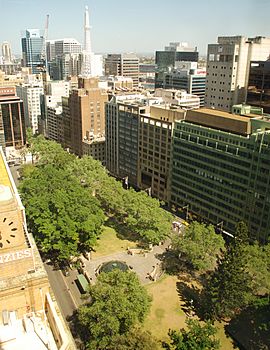Wynyard Park, Sydney facts for kids
Quick facts for kids Wynyard Park |
|
|---|---|

Wynyard Park seen from north
|
|
| Lua error in Module:Location_map at line 420: attempt to index field 'wikibase' (a nil value). | |
| Type | Urban park |
| Location | York, Carrington, Margaret and Wynyard Streets, Sydney central business district, City of Sydney, Sydney, New South Wales, Australia |
| Area | 0.7 hectares (2 acres) |
| Created | 1887 |
| Designer |
|
| Etymology | General Edward Buckley Wynyard |
| Operated by | City of Sydney |
| Open | 24 hours |
| Status | Open all year |
| Public transit access | |
|
Invalid designation
|
|
| Official name: Wynyard Park Including Parkland, Mature Trees, Remnant Fences, Underground; Wynyard Square | |
| Type: | Local government (landscape) |
| Criteria: | a., c., d. |
| Designated: | 9 December 2005 |
| Reference #: | 65 |
| Group: | Parks, Gardens and Trees |
| Category: | Urban park |
|
Invalid designation
|
|
| Official name: Archaeological item - Wynyard Park | |
| Type: | Local government (archaeological - terrestrial) |
| Criteria: | a., c., d. |
| Designated: | 6 December 2006 |
| Group: | Defence |
| Category: | Barracks and housing |
Wynyard Park is a cool urban park in the heart of Sydney, New South Wales, Australia. It's about 0.7 hectares (1.7 acres) big. You can find it surrounded by York, Carrington, Margaret, and Wynyard Streets. Even though it's in a busy area with tall buildings, it's a popular green space. You can also find entrances to Wynyard railway station at the park's corners.
This park is super old! It used to be the first military barracks in Australia. The park's shape and size today come from the old parade ground. It's one of Australia's oldest parks that has always been open to the public. People have used it for meetings, protests, fun, and just relaxing since 1887. Wynyard Park is a favorite spot for office workers to enjoy their lunch. Many buses also start their journeys from the streets around the park.
Contents
The Park's Past: A Look Back
The area where Wynyard Park now stands was once a parade ground. This was for the first military barracks built after Europeans arrived in Sydney in 1788. A famous event called the Rum Rebellion happened here in 1808. The New South Wales Corps marched from this very spot to arrest Governor Bligh.
After new barracks were built in 1848, this old site was divided up. Houses and shops were built, but a square was kept on the higher part. From 1848 to 1887, it was known as Wynyard Square. It was named after General Wynyard, a British military leader.
In 1875, the square became a recreation ground. It was fenced and made pretty with plants. At first, only people with keys could enter, like some parks in England. But by 1907, the fences were removed, making it open to everyone.
How Wynyard Park Changed Over Time
The original military barracks were much larger. They stretched from Barrack Street to almost Jamieson Street. They also went west to Clarence Street.
In the 1880s, buses started picking up passengers here. This began the area's long connection with public transport. People first suggested building a railway station here in 1881. But Wynyard Station didn't open until 1932.
The square officially became a public park in 1887. The next year, a bandstand was built in the middle. The park looked its best between 1890 and 1910. Its design still shows this late Victorian style. Important designers like Mortimer Lewis and Charles Moore helped shape the park. From 1887 onwards, it was called Wynyard Park.
When Sydney's underground railways were built in 1927, Wynyard railway station was a big project. Workers had to dig up the park to build the station. After the station was finished, the park was rebuilt on top.
What You Can See at Wynyard Park Today
At the northern end of the park, you'll find a statue. It was made in 1890 by Giovanni Fontana. The statue honors Reverend J. D. Lang. He was a Presbyterian minister and a bit of a rebel. He lived near Wynyard Square and helped build the Scots Church in 1826. His statue is close to this historic church.
There's also a cool underground men's restroom. It has a fancy domed glass roof. It was built in 1912 and is similar to others in Hyde Park and Taylor Square.
The park has many old, tall trees around its edges. These include Moreton Bay Figs and Plane trees. You can also see an Art Nouveau style toilet block. It includes interesting fences, signs, and lights. There are also old sandstone walls.
Gallery
 | Aurelia Browder |
 | Nannie Helen Burroughs |
 | Michelle Alexander |




